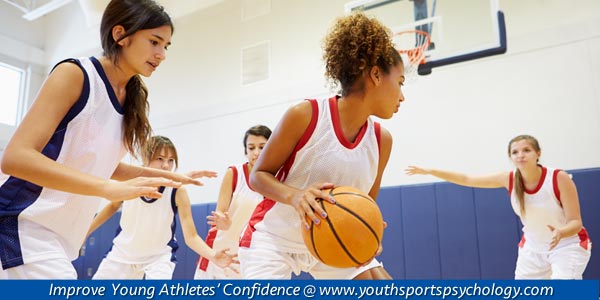
The Biggest Confidence Challenges for Young Athletes
They immediately focus on the negative side of the feedback that coaches are trying to give them.
That’s the word from Hal Wissel, a basketball coach who has worked for numerous NBA teams, is founder of Basketball World, and author of “Basketball: Steps to Success.”
We interviewed Wissel about his tips for building confidence in basketball shooters, and he offered some observations that apply to all young athletes.
“If you try to explain how to shoot, kids will immediately think something is wrong because you’re giving them feedback,” he says. “Many players start with the negative and think they can’t shoot.”
It’s key to begin with the positive, and to build confidence, he says. One way to do that is to teach
young athletes how to look and act like athletes.
For example, he teaches basketball players to leave their hand up in a follow-up position after they take a shot. “I tell them they look and act like shooters when they do this,” he says. “That’s a mental game advantage.”
He also reminds shooters that they don’t have to be perfect players to make a shot. Players need to avoid paralysis by analysis, he adds.
“If a player is thinking about three or four aspects of the shot, they can’t function. Skills should be free-flowing and rhythmical. If you think about too many things, it becomes mechanical.”
To teach kids to flow more freely, he teaches them rhythm.
“We teach them to bend their knees slightly and use a down-up motion. Do the down and up, start the shot and release the ball.”
“Rhythm gives them the range to make 3-point shots,” he says.
The idea is to get them into a “flow” that allows them to play intuitively and take risks. These are key to helping young athletes grow, as we’ve said many times!
Related Articles on Kids’ Mental Game:
- Athletes Who Doubt Their Abilities Before Games
- Sports Parents, Watch Your Body Language with Your Young Athletes
- Josh Thole’s Take on Coping With Mistakes
*Subscribe to The Sports Psychology Podcast on iTunes
*Subscribe to The Sports Psychology Podcast on Spotify
Improve Your Mental Game From Anywhere In The World

We’re certain that, as a parent, you want to help your child develop confidence and discipline in sports and life. And as a sports parent, you’d love for your children to reach their potential in sports. But encouraging your child to strive for greatness without pressuring them can be a challenge.
You can get expert mental coaching with us from anywhere. Meet with us via Zoom, Skype, FaceTime or phone call. With today’s video technology, we are able to connect with athletes and coaches all over the globe.
Call Us Today to Schedule Your Free 15-Minute Session.
Find Out How Your Athlete Can Benefit From One-on-One Mental Coaching!

“The idea is to get them into a “flow” that allows them to play intuitively and take risks.”
I think that’s a great approach to coaching. You don’t want your players to have to think through every movement of a play because they’ll get hung up on one step. It has to become second nature so they can think on the fly.